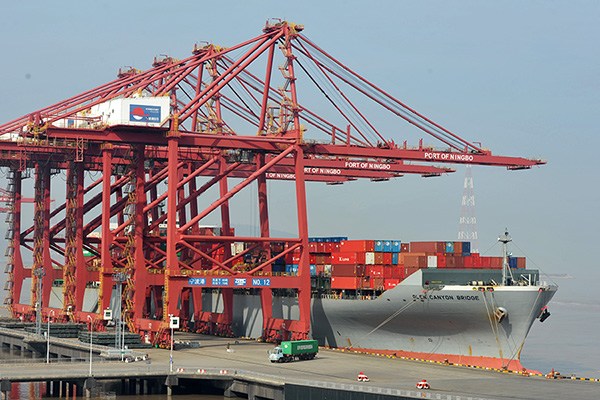 A container ship docks at the Port of Ningbo, East China's Zhenjiang province. (Photo/Xinhua) A U.S. rule being used to look into Beijing's trade practices is too out of date to provide effective measures to relieve its trade deficit with China, and international trade friction can never be solved through unilateral acts, senior experts from both countries said. The U.S. trade representative initiated the investigation on Friday under Section 301 of Trade Act of 1974, examining China's intellectual property policies and practices. That came just four days after President Donald Trump signed a memorandum authorizing the trade representative to determine if an investigation was necessary. The move by the United States signals that the current bilateral economic and trade relations are "at a crossroads", said Wei Jianguo, vice-president of Beijing-based China Center for International Economic Exchanges. "China needs to prevent the Trump administration from replacing the bilateral, multilateral and global trade rules with unilateralism on trade," the former vice-minister of commerce told China Daily on Sunday. Wei said the "Cold War mentality" of the U.S. is dangerous. "It will result in global trade recession and chaos," he said. "The trade imbalance is caused by the distribution of the global value chain and the differentiated industrial structure," said Bai Ming, a researcher with the Chinese Academy of International Trade and Economic Cooperation in Beijing. Bai said the labor in the U.S. costs more than in China, therefore it does not have an advantage in manufacturing to compete with China, but it has a notable edge in high-tech products and services trade with China. "Such unilateral trade sanctions on China will not stop the progress of globalization and such action will only weaken the ability of companies to earn in both countries," said Bai. "No one can force China to obey other countries in conducting trade activities." China has warned the U.S. of its actions after Trump signed the memo last week. The Ministry of Commerce responded on Tuesday by saying China will take all necessary and appropriate measures to protect its commercial and trade interests if the U.S. wrongly accuses China of theft of U.S. technology and intellectual property. Foreign Ministry spokeswoman Hua Chunying said last week that "any member of the World Trade Organization should observe its rules in taking trade measures". "Given the increasingly converging China-U.S. interests and the close-knit pattern of the two countries being mutually dependent, there will be no future or winner but only losers in a trade war," she warned. Chad Bown, a senior fellow at the Peterson Institute for International Economics, described the use of Section 301 as dusting off an outdated U.S. trade law that allows the U.S. president to unilaterally impose tariffs on another country. Section 301 was used most by the Reagan administration, when current U.S. Trade Representative Robert Lighthizer served as deputy trade representative. Bown said such a solution may only make matters worse. He said the use of an ill advised and obsolete U.S. trade law is likely to shift attention away from China's actions toward Trump's own policies. The U.S. government has conducted 122 such Section 301 investigations since 1974. |
Powered by Discuz! X3.4
© 2001-2013 Comsenz Inc.